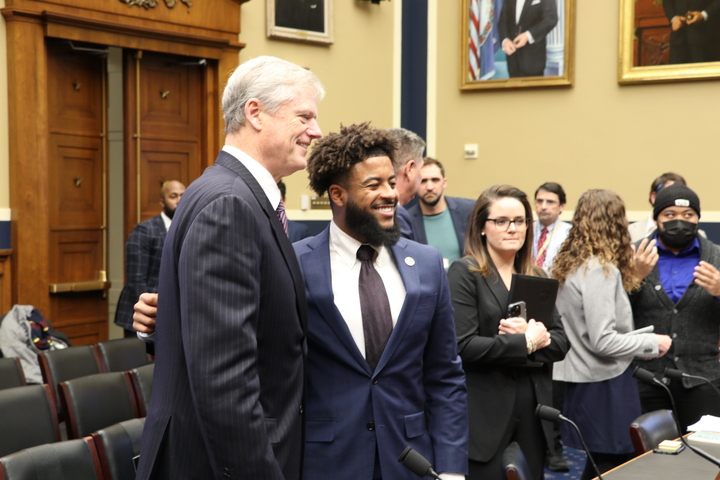WASHINGTON – Some legislators want immediate action on the FAIR College Sports Act, meant to standardize state laws on student-athletes profiting from their personal brands, but it looks unlikely that Congress can come to an agreement anytime soon.
Lawmakers and witnesses at a hearing Thursday by a House subcommittee disagreed over appropriate forms of compensation from universities for their athletes, transparency requirements for businesses making deals with athletes and even whether a federal standard should exist.
The NCAA first allowed student-athletes to profit off their name, image and likeness in 2021, if consistent with state laws. This allows athletes to sign deals with outside organizations ranging from hundreds to millions of dollars.
“The sudden transition to NIL has enabled a wild west environment where pay for play is rampant,” said Subcommittee Chair Rep. Gus Bilirakis (R-Fla.).
The FAIR Act, introduced by Rep. Bilirakis, would protect the right of students to enter into NIL contracts, with “reasonable limits” on the time they may spend on endorsements. It would also ban athletes from accepting incentives to attend an institution and require them to notify a government-created commission when they enter into a contract.
Under current NCAA rules, universities must take a hands-off approach to their athlete’s NIL contracts. Representatives and witnesses pointed to instances of collectives taking advantage of athletes’ lack of support. In one instance, reported by The Athletic, a collective agreed to pay an athlete $1.5 million across two years but included clauses in the contract that allowed them to ask for the money to be repaid, as well as a 10% commission and expenses, even if the agreement were terminated.
Meredith Page, a Division I volleyball player at Radford University, testified that many students are leaving their existing scholarships to enter the transfer portal, with collectives promising high-paying opportunities at another school, only to find that those opportunities are no longer available. There is currently no accountability mechanism when this happens, Page said.
“Until there’s some transparency and some consequence associated with this, I think we’re going to continue to have this problem,” said Charlie Baker, president of the NCAA.
Chase Griffin, a Division I football player at UCLA with more than 40 NIL deals, said the oversight mechanisms would discourage businesses from offering these deals, yielding less compensation for student athletes’ hard work.
Griffin also pushed against an oversight body appointed by the government, based on responses to a survey of college athletes that he helped lead. When Rep. Lori Trahan (D-Mass.) asked Griffin who student-athletes trust the least, he answered, “Congress.”
“That should concern each one of us here today, that the very people this committee is looking to ‘protect’ don’t actually trust that we have their best interest at heart,” Trahan said. “I don’t think that, as drafted, the bill that we’re focusing on today will do much to change that.”
Meanwhile, the National Labor Relations Board has brought a case against the University of Southern California, the Pac-12 Conference and the NCAA arguing that college athletes should be classified as employees.
The student-athlete witnesses emphasized that they would not like to become university employees. Kaitlin Tholl, a Division I softball player at the University of Michigan, cited concerns over getting fired for poor performance and confusion over the financial consequences.
“Will I be taxed? Will I lose my scholarship? Will I be paid minimum wage? There’s so much that goes into it that I think people need to be careful what they wish for,” Tholl said.



